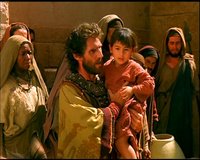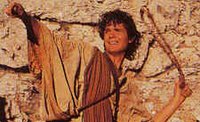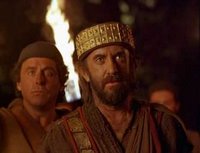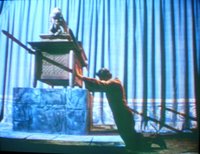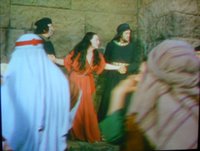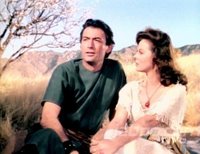 Give the average quiz show host the category "The Bible" and ask them to complete the following - David and - and you'd get the same answer every time. Indeed the working title for Scott Derickson's proposed film about events from the books of Samuel even omits David's name, opting simply for Goliath.
Give the average quiz show host the category "The Bible" and ask them to complete the following - David and - and you'd get the same answer every time. Indeed the working title for Scott Derickson's proposed film about events from the books of Samuel even omits David's name, opting simply for Goliath.The giant everyone loves to hate does feature in Testament's David and Saul, but he's a relatively minor figure. Even David is not the film's greatest concern. The film might even have been called Saul and David - it's Israel's first king that is the leading character in this production, rather than his more famous successor.
I remember very little of David and Saul from my first viewing roughly eight years ago. It certainly didn't make much of an impression. This time around however it was quite different. Eight years on it seems like a complex and striking examination of a man fighting his demons. Whether or not "demons" should be taken literally perhaps accounts for the difference in my reactions to my two viewings of this film. Then I was open to the idea that when the Bible said demons it may, on occasion, simply be talking about something like epilepsy. Now I would tend to assume some form of health issue was what was being mentioned even if I remain open to the possibility that occasionally something supernatural might be responsible.
That the film is primarily about what is going on in Saul's head is apparent from the opening scene. Instead of seeing David in the fields chasing lambs, or wistfully playing his harp in the countryside, we start with Saul raving in his throne room. The location shot tells us that it's night, and it slowly pans up a dark rocky outcrop before reaching a foreboding prison-like castle at the top. The throne room itself is also dimly lit and sinister music accompanies Saul's deep seated paranoia. At the mention of Samuel's name there's a flash back to the last meeting between the two, king and prophet.
Samuel himself is a shadowy figure in this film. Dressed in a dark, hooded, robe he only appears in flashbacks, voices in Saul's head and as an ghostly apparition at the witches cave in Endor. Even Samuel's anointing of David is made highly ambiguous - David certainly doesn't realise he has been appointed king.
By placing Samuel's confrontation of Saul in the midst of this scene of his madness manifesting himself, there's an implication that it is this incident which is the cause of Saul's condition, be it mental illness or spiritual affliction. It's never entirely clear which way the filmmakers understand it. Certainly the characters in the film believe it's the latter, as is consistent with their world-view but the content of the film itself - aside from the narrator's opening mention of Saul being "seized by an evil spirit" - makes a fairly strong case the other way.
It's not until after this scene that David makes an appearance, killing a bear, playing for the king, being outraged by his countrymen's cowardice in the face of Goliath and then volunteering to slay the Philistine giant. But even as Goliath is hitting the floor, Saul is haunted by Samuel's voice in his head: "Another man, a better man than you...". This leads into a montage of David's victories, his adoration at the hands of the crowd and the evident love Saul's children have for him. Each moment is accompanied by Samuel's same words, "Another man, a better man than you...". One particularly enjoyable visual moment here is a pan across a stone relief depicting David's victories.
David continues to play to soothe Saul's turmoil and Saul attempts to kill him. David flees and Saul hunts him down. Whilst in his pursuit Saul hears of Samuel's death, hears the prophet's voice "we shall never meet again" and decides to outlaw consulting with the dead. The next scene is of David sneaking into Saul's camp and stealing his spear.
The final part of the film deals with Saul's death. His armies face the numerically superior Philistines and being unable to hear God's voice he seeks out the witch of Endor. Samuel's ghost appears - it's a highly ambiguous portrayal, Samuel's form is transparent and shrouded in green mist. The battle goes on and Saul and Jonathan die. The camera lingers on their dead bodies still upright and greyed out as if they are statues already yesterday's men being commemorated.
This is the true end of the film. There is a final scene but it's an epilogue accompanied only by the narrator's voice. David is crowned in the bright sun. It's pretty much the sun has been seen in the film. The occasional scene has been shot during the day, but the majority of it is portrayed at night, and dark colours dominate the film, particularly where Saul is concerned. The visuals throughout are striking actually. It would be easy to write off David and Saul as a mere cartoon, particularly as it lacks the expressionism of other films in the series, but the animation is far superior to most hand-drawn films: a true work of art. The use of colour is very strong, particularly the contrast between Saul and David, but also the evocative backgrounds, doing for this film what the scenery in so many westerns does for them.
David and Saul may not be a conventional take on the film, but it's all the better for it. Instead of a typical story of the underdog, it's a complex examination of the descent into darkness - mental or spiritual - of Israel's first king, and certainly the finest exploration of Saul that I have seen.










